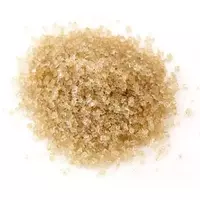Cane sugar

Nowadays, it is increasingly possible to see brown cane sugar in almost all supermarkets and cafes. However, not many people know how it differs from the usual white, and most importantly - this product is useful or not.
Cane sugar is an unrefined sugar that is obtained by boiling cane sugar syrup using a special technology. It is an excellent sweetener and is often used as an additive in various drinks: coffee, cocoa, tea, chocolate, tinctures, fruit and berry juices, various drinks. The taste and aroma of these liquids is enhanced and, one might say, transformed, acquiring more saturated notes. In cooking, cane sugar is used as a sweet additive in the manufacture of dairy products, some salads, confectionery and bakery products: sweets, creams, glazes, ice cream and many others. After all, any dessert without sugar is not a dessert at all.
The calorie content of cane sugar is not much different from its white "brother" and is 377 kcal per 100 grams. This spice can also be used to prepare dishes from turnips, carrots, for stews, carbonades and sauces. The unique properties of cane sugar were also appreciated in Sweden, where culinary geniuses add it to liver pate and pickled herring.
By the way, it is important to be able to distinguish true brown cane sugar from fake. This is because some enterprising manufacturers pass off regular caramel-tinted sugar as a more expensive product. One way to define real sugar is to throw some sugar into warm water. If it took on a golden hue, you bought a regular tinted sweetener. If the colour hasn't changed, you're lucky: you're the owner of a really real cane sugar.
Benefits of cane sugar
The benefits of cane sugar are not in doubt, as it is a source of five B vitamins, which his sweet "colleague" cannot "boast of. " In addition to potassium, which is abundant in this spice, there are also such trace elements as magnesium and iron (in ordinary sugar, magnesium is absent at all, while the amount of iron is ten times less).
The harms of cane sugar
Cane sugar thus has tangible advantages over white sugar. If you are not a foodie, but just take care of your health, but cannot deny yourself sweet sugar, then unrefined sugar is a good solution. However, do not forget that for all the benefits of cane sugar, it still remains a product that should not be abused.
The harm of cane sugar when overused is not limited only to excess reserves of subcutaneous fat, but also manifests itself in the fact that mucus appears in the body. Even a healthy person runs the risk of having a metabolic disorder with an overdose, which can lead to a decrease in immunity.
cane sugar 377 kCal
Energy value of cane sugar (Ratio of proteins, fats, carbohydrates - ju):
Proteins: 0 g (~ 0 kCal)
Fats: 0 g (~ 0 kCal)
Carbohydrates: 97.33 g (~ 389 kCal)
Energy ratio (bj | y): 0% | 0% | 103%
 Español
Español Français
Français Português
Português Русский
Русский 简体中文
简体中文 繁體中文
繁體中文 日本語
日本語 한국어
한국어 العربية
العربية Türkçe
Türkçe Қазақ
Қазақ Deutsch
Deutsch Italiano
Italiano Українська
Українська
